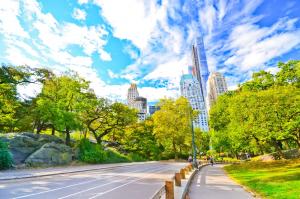
As cities grow, urban planners and city administrators face daily challenges in maintaining healthy, sustainable, liveable, and resilient urban environments capable of contributing to a good quality of life for city dwellers.
The 80th Session of the UNECE Committee on Forests and the Forestry Industry highlighted that urban and peri-urban forests are a cost-effective solution to address the compounding challenges cities face.
Nature should be at the centre of urban planning and design according to architect Stefano Boeri in his keynote address. Well known for The Vertical Forest (Bosco Verticale) in Milan and similar buildings, Mr. Boeri highlighted the importance of tackling climate change and reducing cities’ carbon footprint by establishing and enhancing the relationship between humans and nature. In a proposed solution to the climate emergency and his approach to build sustainable and resilient cities, he envisions a biodiverse metropolis with urban and peri-urban areas and forests connected through green corridors.
Whether in or around cities, tree planting alone is not enough for successful urban forestation projects. Experts in the session agreed that long-term planning and management of urban forests are at the core of expanding and strengthening their contribution to green and resilient cities. Only sufficient resources for long-term management ensure that urban trees and forests grow to maturity and provide their many benefits.
To support these efforts, experts discussed the UNECE Draft Regional Urban Forestry Opportunity Plan, which identifies where actions to expand urban and peri-urban forestry in the UNECE region can make a major difference. It emphasizes that to make cities more sustainable and resilient and support climate action it is critical to plant the right tree in the right place, for the right reasons. For this, strong community and stakeholder engagement must be matched by good coordination and collaborating across most sectors and levels of government.
Urban and peri-urban forests contribute to developing a response to climate change at the national, regional and urban level. Urban trees make our cities:
-
Safer by cooling temperatures by up to 8 degrees and reducing flood risk;
-
Healthier by reducing exposure to pollution and improving mental health;
-
More vibrant by attracting tourists, shoppers and residents to streets and parks; and
-
More diverse, supporting resilience to unknown impacts of future climates on individual species.
These benefits can best be achieved by applying the 3-30-300 rule, a guideline proposed by Cecil Konijnendijk in the 2022 UNECE Policy Brief on Sustainable Urban and Peri-Urban Forestry. This guideline recommends that city dwellers should be able to see at least 3 trees from their home, there should be a 30% tree canopy cover in each neighbourhood and 300 metres should be the maximum distance to the nearest high-quality public green space.
Look out of your window now. How many trees can you see?
Background
Working over 75 years supporting forests, UNECE supports the sustainable management of urban and peri-urban forests across the UNECE region.
In 2019, UNECE launched the Trees in Cities Challenge, a global campaign of mayors who are implementing pledges to make their cities greener, more sustainable and resilient. Over 50 mayors have made Trees in Cities pledges to date, and the Challenge is open for pledges by additional cities.
The Informal Network of Experts on Sustainable Urban Forestry provides a forum for knowledge exchange and capacity-building as well as peer-to-peer learning to strengthen sustainable urban forestry.
More information on urban forestry as an integrative and strategic nature-based solution can be found in the UNECE policy brief “Sustainable Urban and Peri-Urban Forestry”.
More information on actions that can be taken by stakeholders from the local to the UNECE regional level can be found in the “Draft Regional Urban Forestry Opportunities Plan”.

